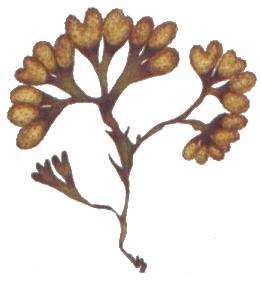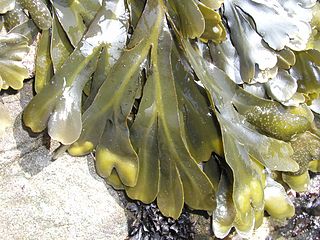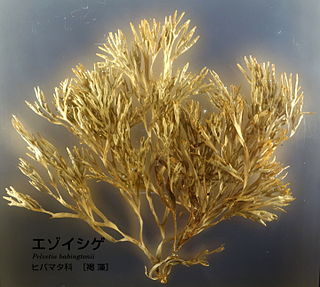
Fucus vesiculosus, known by the common names bladderwrack, black tang, rockweed, sea grapes, bladder fucus, sea oak, cut weed, dyers fucus, red fucus and rock wrack, is a seaweed found on the coasts of the North Sea, the western Baltic Sea and the Atlantic and Pacific Oceans. It was the original source of iodine, discovered in 1811, and was used extensively to treat goitre, a swelling of the thyroid gland related to iodine deficiency.

Fucus spiralis is a species of seaweed, a brown alga, living on the littoral shore of the Atlantic coasts of Europe and North America. It has the common names of spiral wrack and flat wrack.

Fucus distichus or rockweed is a species of brown alga in the family Fucaceae to be found in the intertidal zones of rocky seashores in the Northern Hemisphere, mostly in rock pools.
Algicola is a genus in the phylum Pseudomonadota (Bacteria).

Fucus gardneri is a species of seaweed, a brown alga living on the littoral shore of the Pacific coasts of North America. It has the common names of rockweed and bladderwrack.
Pseudoalteromonas issachenkonii is a marine bacterium which was isolated from the brown alga Fucus evanescens near the Kurile Islands.
Fucus virsoides is a species of brown alga endemic to the Adriatic Sea. The Bay of Kotor was defined as one of the southernmost limits of Fucus virsoides.

Fucophlorethol A is a phlorotannin found in the brown alga Fucus vesiculosus.

Silvetia is a genus of brown algae, commonly known as rockweed, found in the intertidal zone of rocky seashores of the Pacific Ocean. These were originally classified as members of the genus Pelvetia. In 1999, Silvetia sp. was created as a separate species from Pelvetia canaliculata due to differences of oogonium structure and of nucleic acid sequences of the rDNA. It was renamed in honor of Paul Silva, Curator of Algae at the Herbarium of the University of California, Berkeley. There are three species and one subspecies.
Cellulophaga algicola is a bacterium. It was first isolated from the surfaces of the chain-forming sea-ice diatom Melosira. It is most similar to Cellulophaga baltica. Its type strain is IC166T.
Shewanella algicola is a Gram-negative, rod-shaped, aerobic and motile bacterium from the genus Shewanella with a single polar flagella which has been isolated from the alga Sargassum thunbergii from the coast of Jeju Island on Korea.
Ornithinimicrobium algicola is a Gram-positive and non-spore-forming bacterium species from the genus Ornithinimicrobium which has been isolated from the green Ulva.
Marinicauda algicola is a Gram-negative bacterium from the genus of Marinicauda which has been isolated from the alga Rhodosorus marinus from Korea.
Winogradskyella algicola is a bacterium from the genus Winogradskyella which occur in the alga Dunaliella tertiolecta.
Alkalihalobacillus is a genus of gram-positive or gram-variable rod-shaped bacteria in the family Bacillaceae from the order Bacillales. The type species of this genus is Alkalihalobacillus alcalophilus.
Flavihalobacter is a Gram-negative, aerobic, rod-shaped and non-motile genus of bacteria from the family of Flavobacteriaceae with one known species. Flavihalobacter algicola has been isolated from the alga Saccharina japonica from Weihai.
Flavivirga algicola is a bacterium from the genus of Flavivirga which has been isolated from a red alga from the coast of Weihai.
Lacinutrix algicola is a Gram-negative, aerobic and heterotrophic bacterium from the genus of Lacinutrix which has been isolated from a red alga.
Olleya algicola is a Gram-negative, strictly aerobic, rod-shaped and motile bacterium from the genus of Olleya which has been isolated from the alga Ulva fenestrata from the Pacific.
Aquimarina algicola is a bacterium from the genus of Aquimarina.





